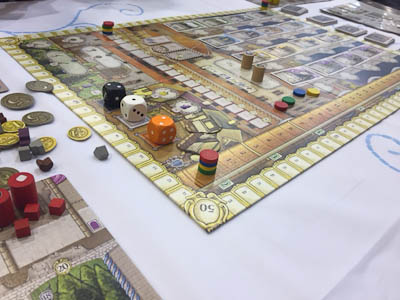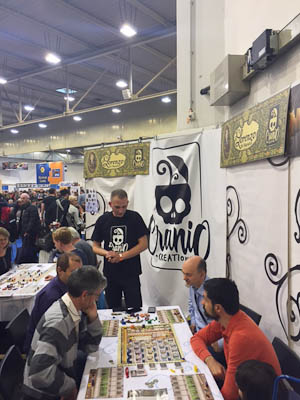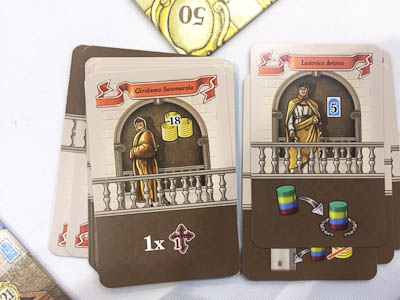

![[IMAGE]](../bilder/magnific1.jpg) |
Authors: Publisher: No. of Players: |
![[IMAGE]](../technik/box/rot/rot-7.gif) ![[IMAGE]](../technik/box/gelb/gelb-8.gif) ![[IMAGE]](../technik/box/grun/grun-7.gif) ![[IMAGE]](../technik/box/pink/pink-8.gif) ![[IMAGE]](../technik/box/blau/blau-8.gif) |
|
Gamebox author Ralf Togler writes about the game:
I still remember the days at SPIEL, when CRANIO CREATIONS first visited the convention and presented Dungeon Fighter, a crazy, funny game that I truly love. Today, they still have those funny games, for example Monster Tower, or the great Unusual Suspects. But next to these fun and party games they have developed a more serious line of games, games for the real gamers, indeed.
Lorenzo il Magnifico is such a game for the experienced gamer, as it is a rather complex and tactical game. The game takes place in Florence during the renaissance and it is said that in these times a lot of prosperous families tried to extend their sphere of influence. They did this by conquering new territories, giving whole buildings to charity and bribing persons of great consequence. Of course, all of this took place under the suspicious eye of the church. Only if your sacrifice for the church was appropriate, you were able to do what you want. Otherwise, excommunication was the penalty for the rich and the poor likewise, because the influence of the church was far-reaching and no one was immune to it.
Lorenzo il Magnifico is a typical worker placement game of the more complex kind. Comparable to a Stefan Feld game you have many opportunities to gain victory points, but you must work hard for the best strategy to win the game. The main part of the game takes place on a general board. On top of this board, we can find four columns for the different development sectors (territories, buildings, characters and ventures). In the middle, there is an excommunication area, where we track our offers to the church. Then we can find two spaces for activating the developments we have bought in earlier rounds, tracks for VP, military points and faith. Finally, there is an area to place dice that determine the strength of our individual family members for the round. Next to the general board, every player has his own personal board to place his acquired territories, buildings and so on.
 Now in the game the players perform actions along 3 periods of 2 rounds each. At the beginning of each round, new development cards of every type are revealed and placed in the appropriate columns of the general board. Each column has four spaces for the cards, each with its own cost to take the card. You can acquire these cards in your turn by placing one of your family members on the die symbol next to the cards on the general board. However, you must also fulfill the requirements to do so. Each action symbol shows the minimum strength that your family member must bring along. Every player has four family members. One of them is uncoloured and it always has a strength of 1. All other family members differ in strength from one round to the other. Dice that are rerolled at the beginning of each round determine the current strength for every player. Luckily enough we have some servants, who can increase the strength of a family member, so it is always good to have some servants in your hand.  Most development cards find their way to the players' personal boards and so you gradually develop your dynasty. Every development gives you more variety and power for later rounds. Territories for example are an important source of goods while characters give you special bonus actions. There are immediate and permanent effects of a card and some of the cards also have to be activated again, if you want to use them. To activate a card you must once again send one of your family members to the associated space on the main board. Again the strength of this family member is important, as it determines if and which cards on your personal board can be activated by the action. At the end of a period, in the Vatican report, you have to proove your support to the church. It is not the worst advice to send some of your family members to offer, because only if you have collected enough faith points you can prevent excommunication. On the other hand a family member can only be used once in a round and if it is offering to the church, it cannot be sent to the development columns in the same round. If you are well on the way to calculate the risk of excommunication, victory may be yours. On the other hand, although ostracized, excommunication does not mean you are out of game. But you must suffer a malus that perhaps cannot be caught up by alternate actions of your family members...  Lorenzo il Magnifico offers a lot to discover. Do you like to play a decent citizen, who upholds the church? Or will you spare your money and risk an early excommunication? All the different strategies might lead to victory. But there is so much to consider in a round and so much to do with only four family members that you cannot say the one or other strategy is the better one. What really counts is your tactical adaptability. The randomly drawn development cards, the dice that determine the current strength of your family members, the various effects of the randomly drawn excommunication tiles and last but not least the actions of your opponents: all that influences the gameplay and the options to cleverly act in the game. In the end Lorenzo il Magnifico is – although somehow traditional – one of the best designed worker placement games I have played. A straightforward design, many options and details to try out and a story that fits to the game. I am already curious about an expansion. | ||
|
| ||

|
|

|
|
| ||
|
Impressum / Contact Info / Disclaimer Kulkmann@aol.com
Copyright © 2017 Frank Schulte-Kulkmann, Essen, Germany | ||